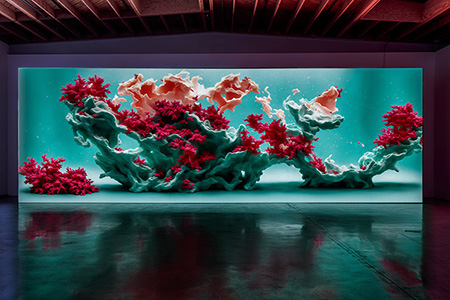
Continuing through April 29, 2023
Refik Anadol began his career making humble data-driven artworks that adorn public facades, filling them with undulating colors based on different systems and information sources. Now Anadol has become an international star whose generative imagery covers museum walls and even recently served as the backdrop for the 2023 Grammy Awards. The Istanbul-born, Los Angeles-based artist creates large-scale, ever-morphing generative imagery that uses AI and draws from various datasets.
Anadol’s first solo gallery exhibition also serves as an introduction for those not already familiar with his work and his process, as some of the pieces on exhibit serve a didactic as well as visual purpose. Included are explanatory videos that illustrate the concepts and research that went into creating the works. While it is helpful to understand the why and how, the power of the exhibition is its sheer visual and sonic bombardment.
One of the exhibition highlights is a huge LED wall that alternates between “Artificial Realities: Coral Dreams” and “Artificial Realities: Winds of LA, Pacific Ocean, California Landscapes.” Both are based on datasets collected from the Los Angeles area, and the display alternates between abstract and representational imagery. Through the sequence, coral and sea plants become undulating and twisting abstractions derived from data-mapping the source imagery. Anadol often collaborates with scientists and composers on the development and final presentation of the works. “Artificial Realities” resonates with the impact it does in part because it is coupled with a frenetic soundscape that increases the intensity of the experience. While it is easy to be mesmerized by the nuances of this ever-changing large-scale display, it is only one of many works in the exhibition.
In moving to the very back of the darkened gallery one finds Anadol's Los Angeles rendition of “Infinity Room” (originally created in 2015), an immersive mirrored environment filled with black and white projections featuring lines and geometric shapes that completely surrounds the viewer. A four-channel soundscape accompanies the work, which runs for fourteen minutes and was created with Anadol's custom software. The installation is purposely disorienting. It skews one's equilibrium and conventional modes of perception, creating a jarring, disorienting sense of space.
Contrasting with the more immersive works, the exhibition includes a scale model and video documentation of Anadol's 2019 projection on the Walt Disney Concert Hall. For this site-specific commission, Anadol developed a unique machine intelligence program that culled through the Los Angeles Philharmonic archives to create a visual artwork projected on the facade of the building. The work traces the history of the orchestra, integrating images and graphics in a kaleidoscopic collage.
Another explanatory video engulfs the far back wall of the gallery from floor to ceiling. This piece illustrates some of Anadol's environmentally based visualizations. It is juxtaposed with three small square screens on pedestals showing versions from “Machine Hallucinations: California Landscapes,” a work based on a dataset of 155 million images of nature. As described on his website, "using StyleGAN2-ADA to capture the machine’s hallucinations of California landscapes and colors in a multi-dimensional space, Anadol and his team trained a unique AI model with subsets of the collected image archive. Each image in the series displays a cluster of chosen ‘hallucinations,’ and Anadol makes selections from countless serendipitous allusions to landscape images occurring in the machine-mind."
Anadol has dedicated resources researching machine learning to train his computers to be "artists." Using AI, they "generate abstracted landscapes, constructing new aesthetic visuals and color combinations based on the dataset and through unique lines drawn by algorithmic connections." Using a term like hallucinations suggests an embodiment of machines that evokes the current frenzy around newly released AI tools like ChatGPT and Dall-E, but with a discipline and purpose that few today match.
Along the central gallery space, twelve vertically oriented LED screens span opposing walls, displaying looping videos that visualize different aspects of the California landscape. Each screen houses a sixteen-minute sequence that illustrates the diversity and complexity of Anadol's algorithms. It is interesting to try to reverse engineer the process to understand how the machine interprets data, turning pictures of natural elements into arrays of ever-mutating pixels. Relationships can be made between recognizable depictions of the landscape and the machine's interpretations. At any scale, Anadol's works are filled with undulating and swirling arrays of colored imagery, presented as tiny pixels that are forever breaking apart and coalescing. The motion is always mesmerizing and eye-catching.
Anadol explores the intersection between the latest digital technology and aesthetics. As the technologies become more complex, they move further and further away from traditional aesthetic subjectivity. While Anadol is interested in the brain and the way memories can be visualized, the works here are mostly about process — how the machine learns and how AI can sift through data and transform it into graphic arrays that wow audiences with the spectacle, but ultimately don't do much more than that.
